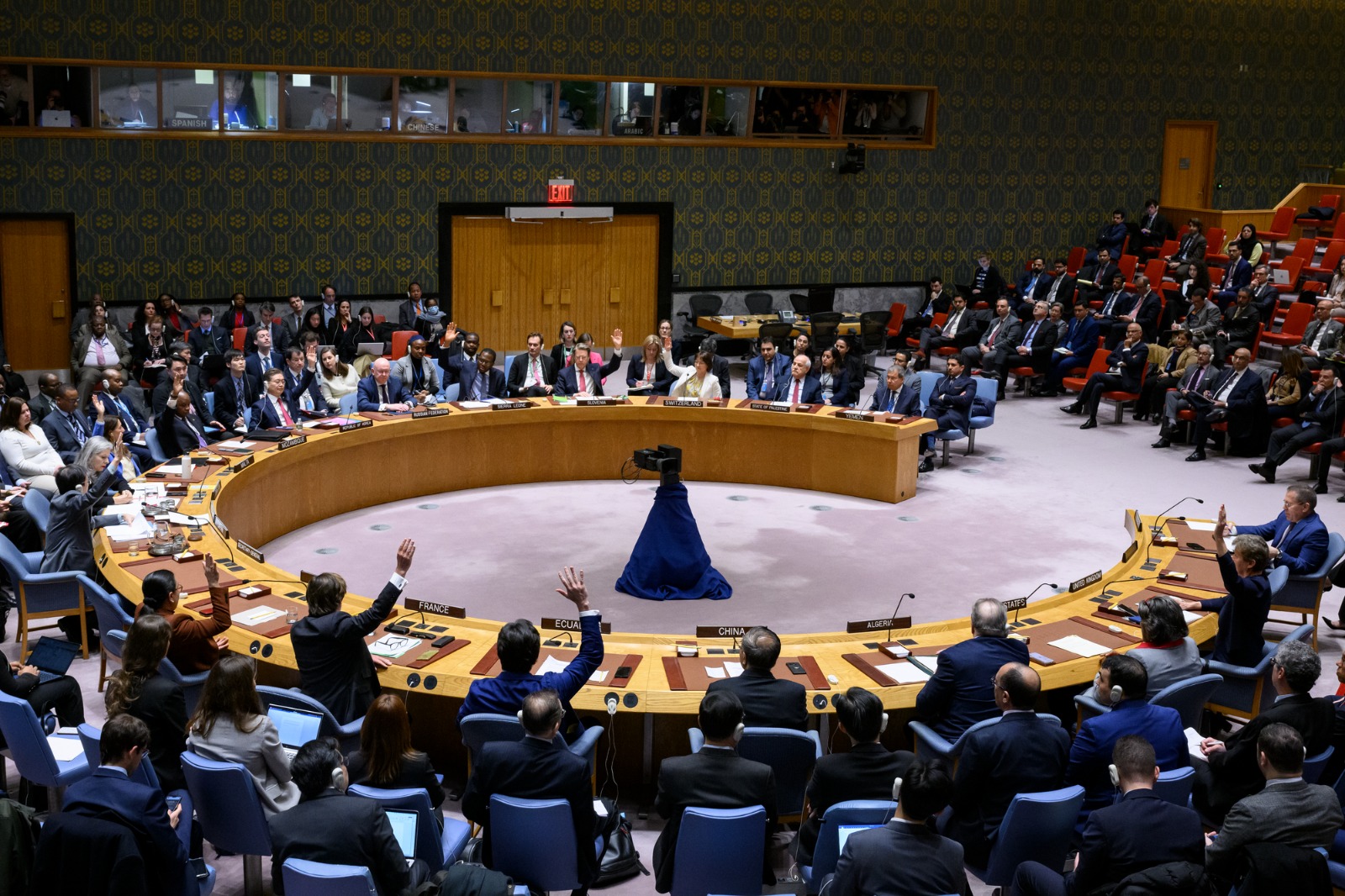Qatar hopes the UNSC resolution will pave the way for a permanent halt to the war in Gaza, where a catastrophic humanitarian condition continues to unfold.
Qatar has welcomed the adoption of a United Nations Security Council [UNSC] resolution calling for an immediate ceasefire in Gaza for the rest of Ramadan, noting that mediation efforts aimed at ending the war are ongoing.
In a statement, Qatar’s foreign ministry hoped the UNSC resolution would pave the way for a permanent halt to the war in Gaza “especially in light of the catastrophic humanitarian conditions.”
“The Ministry of Foreign Affairs stresses the need to comply with the implementation of the resolution, especially stopping the hostilities, facilitating the urgent and unhindered entry of humanitarian aid to all areas of the Strip, and positively engaging in the ongoing negotiations,” the statement added.
The UNSC adopted the resolution following a majority vote of 14 members as the United States abstained, a move that angered its ally, Israel.
The UN body also praised Qatar’s mediation role alongside Egypt and the U.S. in reaching a ceasefire in Gaza and releasing the captives.
“The Ministry expresses the State of Qatar’s hope that the vote of 14 countries in favour of the resolution will constitute a fundamental shift in the international community’s awareness of the seriousness of the tragic situation in the Occupied Palestinian Territories and Gaza Strip in particular,” the statement added.
The resolution comes halfway through Ramadan after indirect negotiations between Israel and Hamas have yet to reach a breakthrough.
Nearly six months on, the Israeli genocidal war on Gaza has killed 32,333 Palestinians while displacing more than 80 percent of the population.
The resolution was sponsored by Algeria, Slovenia, Switzerland, Ecuador, Guyana, Japan, Malta, Mozambique, South Korea, and Sierra Leone, with Algeria representing the Arab countries in the resolution.
Hamas welcomed the UNSC vote, noting that the international community bears the responsibility to ensure Israel abides by it.
“It is the role of the international community to oblige Israel and to end this double standard,” Basem Naim, a senior Hamas official from its political bureau, told Al Jazeera.
“The question is ‘How strong is the international community to oblige Israel to implement this resolution?’” he added.
Riyad Mansour, Palestine’s Permanent Observer at the UN, said the resolution “must be a turning point.”
“This must be a turning point; this must lead to saving lives on the ground. This must signal the end of this assault of atrocities against our people,” he said.
UN Secretary-General Antonio Guterres said failure to implement the resolution “would be unforgivable.”
Washington’s decision to abstain from voting was widely seen as a result of mounting frustration towards Tel Aviv’s war policies. Notably, the U.S. had used its veto power to block three other UNSC resolutions.
Israeli Prime Minister Benjamin Netanyahu cancelled his delegation’s visit to Washington on Monday due to the U.S. abstention during the vote, his office announced. The visit was aimed at discussing Israel’s planned Rafah invasion.
“Today’s resolution gives Hamas hope that international pressure will force Israel to accept a ceasefire without the release of our hostages, thus harming both the war effort and the effort to release the hostages,” Netanyahu’s office said.
U.S. State Department spokesman Matthew Miller said his country abstained as it had issues with the text, including not condemning Hamas’s October 7 attack on Israel.
“The reason we didn’t veto it is because there were also things in that resolution that were consistent with our long-term position; most importantly, that there should be a ceasefire, and that there should be a release of hostages,” he told the press.
Miller also described the resolution as “non-binding,” despite UNSC resolutions being binding on all member states and a reflection of international law.
“It’s a non-binding resolution and I would defer to international lawyers to speak in detail to that question,” Miller said when pressed by journalists on the application of the resolution.
The resolution came as Qatar-mediated talks continue to take place in the Gulf country with officials from Egypt and the U.S.
However, Miller told the press that the UNSC resolution will not impact the negotiations.
“We have active, ongoing negotiations to try to achieve what this resolution calls for, which is an immediate ceasefire and the release of hostages. I don’t, I can’t say that this resolution is going to have any impact on those negotiations,” he said.
The negotiations to release the remaining 130 captives from Hamas and end the war in Gaza have stalled since the expiration of the previous pause.
Last year, Qatar and Egypt mediated a truce that lasted between November 24 and December 1, enabling the release of at least 110 Israeli and foreign captives from Gaza.
The deal led to the release of 242 Palestinian women and children from Israeli prisons, though Israel re-arrested at least 11 of those who were released since the beginning of the year.
Meanwhile, Israel has continued its raid on the Al-Shifa Medical Complex in Gaza and bombed the upper floor of its main building on Monday.
The hospital has around 7,000 displaced people and patients trapped inside under the occupation forces’ non-stop gunfire, according to Palestine’s news agency (Wafa).
Witnesses told Wafa that Israel was detaining and killing the displaced while ordering everyone inside the hospital to leave. Israel detained about 500 civilians from the medical facility, Wafa reported.
Five Palestinians have also died at the Al-Shifa hospital “due to the absence of health services, food, and water, and the power outage in the intensive care units,” witnesses told Wafa.







